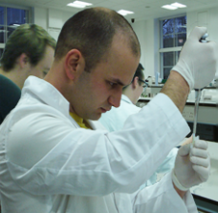
Quantifying nucleic acids by real-time PCR – Practical Workshop
Next workshop: Thursday 25th and Friday 26th April 2024
£480 academic participants, £580 other participants
Earlybird registration deadline is two weeks before the course start date. After this deadline an additional £100 fee applies. Workshops are held at the qStandard laboratory in Edgware.
Scroll down to see a summary of the feedback from the previous participants and course content
| Register here for this hands-on course (you will be asked to confirm that you have read the Terms and Conditions before registering).This two-day workshop is aimed at those who would like to use real-time PCR to quantify DNA or mRNA. It has evolved from workshops we have run over the past 14 years for the BBSRC Molecular Training for Industry programme, King’s College graduate school and The Physiological Society. Participants are expected to have a theoretical understanding of the polymerase chain reaction and reverse transcription. No prior knowledge of real-time PCR is expected. Accommodation and travel costs are not included in the price. For more information on payment methods and how to get there please visit the links to the right.Feedback summary from previous workshops (n=35)What was your overall evaluation of the workshop? Poor (0) 0% OK (1) 2.9% Good (6) 17.1% Excellent (28) 80.0% Did you find that 2 days was – The practical and theoretical material covered in the workshop – Did you attend this workshop because – Comments “Very well explained – expert tips from experienced professionals.” “All my queries were answered!!!” “Set out perfectly, everything you need.” “Workshop was great, really enjoyed it. Very informative, great handouts.” “Excellent practical experience. Answers lots of questions.” “Great course will be recommending to others.” “Complete coverage of all steps from RNA extraction to data analysis was really good.” “The small group enabled more direct interaction and facilitated questions.” “The workshop hosts are excellent trainers. Very enjoyable 2-day workshop.” “Liked no bias for instruments and kits.” “Very in depth, clear, through explanation.” “I had a brilliant 2 days, thanks you very much!” |
![]()
Course Content
Workshop Day 1 – 09.30-17.30
Sample/template preparation
Theory: Isolation of DNA, total RNA and mRNA. Assessing template quantity and quality prior to qPCR.
Practical: Isolation of total RNA from tissue using spin columns. Analysis of total RNA quantity using a Qubit fluorimeter, and RNA quality using an Agilent Bioanalyzer.
Reverse transcription (RT) of mRNA and preparation of known copy number standards
Theory: Use of total RNA or mRNA. RT priming strategies and enzymes.
Practical: Set up RT reaction with total RNA isolated earlier. Set up a qPCR assay with the newly-synthesised cDNA. Check PCR product specificity/identity by agarose gel electrophoresis.
Assay design
Theory: qPCR assay development; primer design; product detection strategies; PCR conditions/optimisation.
Standard operating procedures
Theory: How to avoid contamination
Workshop Day 2 – 09.15-16.30
qPCR
Practical: Set up and run a quantititive probe assay. Prepare a standard dilution series. Set up and run a quantitative SYBR Green assay with standards, cDNA samples, and positive and negative controls.
Data analysis
Practical: Evaluate assay efficiency, sensitivity, reliability, accuracy. Compare results from probe and SYBR assays.
Theory: Aspects of data analysis: Normalisation of qPCR data – demonstration of geNorm, absolute versus relative quantification, quality control and MIQE.
Practical: Analyse a provided RT-qPCR dataset. Evaluate assay efficiency, select reference genes for normalisation, normalise data and compare group means (a limited number of computers will be provided but we ask participants to bring a PC laptop if possible).
Theory: Troubleshooting and questions.
